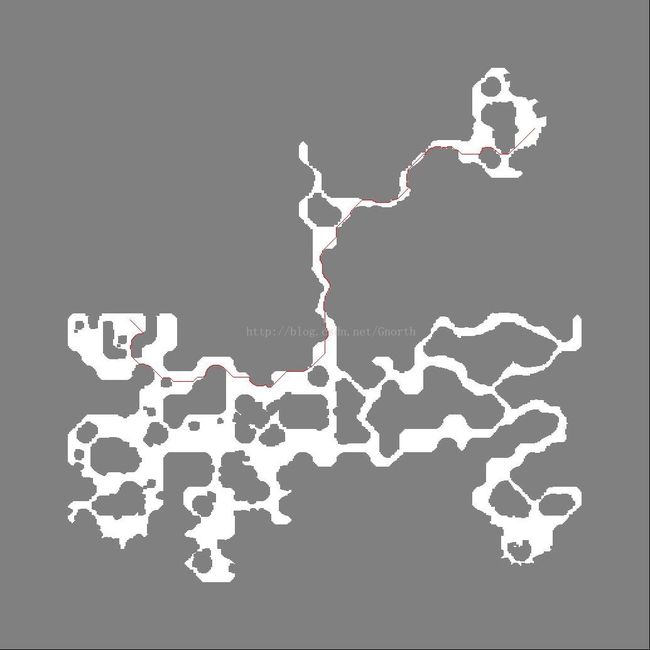对A*算法的路径进行优化
如果你没有看过上一个文章的代码,请到这个传送门:A*算法的实现
注:优化最终路径,必然会对算法耗时造成一定的影响。
针对上一篇文章,我提到的设想,对路径进行分段处理,每一小段再进行一次A*,那么我们需要新增一个SearchEx接口,并对原本的Search接口进行修改。
Search新增一个参数,用来代替原本的BREAK_GAP常量宏,在Search中,清理内存时,将地图数据恢复。
修改后的源代码如下:
bool CAStar::Search(int X, int Y, std::list &lResult, double dbGapBreak)
{
if(X < 0 || Y < 0
|| X > m_dwMapWidth || Y > m_dwMapWidth ||
m_dwDestinationX < 0 || m_dwDestinationX < 0 ||
m_dwDestinationX > m_dwMapWidth || m_dwDestinationY > m_dwMapHeight)
{
//_outf("坐标或地图参数错误!");
return false;
}
LPAPOINT p = new APOINT;
p->x = X;
p->y = Y;
p->parent = NULL;
p->dbGap = _p2g(X, Y, m_dwDestinationX, m_dwDestinationY);
m_lOpen.push_front(p);//起始节点加入到开启列表
m_lSafe.push_back(p);//加入到公共容器,任何新分配的节点,都要加入到这里,便于算法执行完后清理
std::list::iterator it;
DWORD dwTime = clock();
while(!m_lOpen.empty())
{
//这里就是反复遍历开启列表选择距离最小的节点
it = GetMingapNode();
if((*it)->dbGap <= dbGapBreak)
break;
p = *it;
GenerateSuccessors(it);
}
if(!m_lOpen.empty())
{
//如果列表不为空,从最后一个节点开始拷贝路径到返回值中
//_outf("最终寻路到:%X, %X", p->x, p->y);
POINT point;
while(p)
{
point.x = p->x;
point.y = p->y;
lResult.push_front(point);
p = p->parent;
}
}
for(it = m_lSafe.begin(); it != m_lSafe.end(); ++it)
{
//清理内存
if(*it != NULL)
{
m_pMap[(*it)->y][(*it)->x] = 1;//会被添加到m_lSafe的节点,一定是最初为1的节点,所以可以在这里恢复地图数据
delete (*it);
*it = NULL;
}
}
m_lSafe.clear();//清空容器
//_outf("耗时:%d 毫秒", clock() - dwTime);
if(m_lOpen.empty())
{
//_outf("寻路失败");
return false;
}
m_lOpen.clear();//清空开启列表
//_outf("寻路成功,节点数:%d", lResult.size());
return true;
} 新增的SearchEx源代码如下:
nBeginSift 参数为循环初始值,nEndSift为循环结束值,其实就是一个for循环的起始值与结束值。
这个循环的引用计数,最终会被 乘于 10 来作为距离分段选择路径进行路线优化
nBeginSift 与 nEndSift的间距越大,并不表示最终路径就越好,最终优化出来的路径,还是会和地形有关。
其实最好路径优化算法是按照角度的变化来选择路径优化,但是预计开销会比较大,有了这个优化方式作为基础,你可以自己去写根据角度变化来优化的算法。
bool CAStar::SearchEx(int X, int Y, std::list &lResult, double dbGapBreak, int nBeginSift, int nEndSift)
{
DWORD dwTime = clock();
if(!Search(X, Y, lResult, dbGapBreak))
return false;
std::list::iterator it = lResult.begin();
std::list::iterator it2 = it;
std::list l2;
for(int i = nBeginSift; i < nEndSift; i++)
{
it = lResult.begin();
it2 = it;
for(;it != lResult.end(); ++it)
{
if(_p2g(it2->x, it2->y, it->x, it->y) > (double)(i * 10))
{
SetDestinationPos(it->x, it->y);
l2.clear();
if(Search(it2->x, it2->y, l2, 0.0))
{
it = lResult.erase(it2, it);
lResult.insert(it, (l2.begin()), (l2.end()));
}
it2 = it;
}
}
}
_outf("耗时:%d 毫秒", clock() - dwTime);
return true;
} 以下为 nBeginSift = 6 nEndSift = 15 的优化结果。
测试时间结果:
[3368] 耗时:47 毫秒
